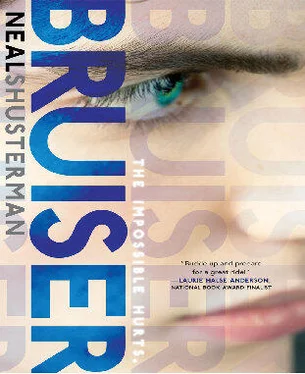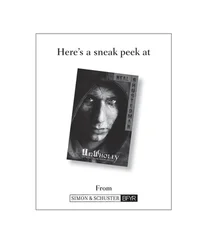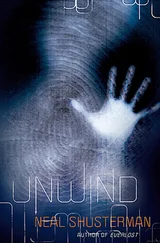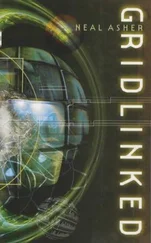Suddenly the whistle blows. The Gators have scored. I was so distracted by my own thoughts, I didn’t even see it, and I’m furious at myself. I have to stay focused!
“Don’t worry,” I call to my teammates. “It’s just the first quarter. We’ll get it back!”
I line up for the face-off, taking my anger and molding it until I’m a controlled ball of fury, using the lost goal to propel me toward victory.
With possession of the ball again, I barrel through an opening, toward the Gators’ goal. I’m almost there when out of my blind spot one of their defenders races in to me. He’s big, beefy, and checks me so hard I go flying. There’s a pain in my gut and panic in my chest, like the air has been sucked from the planet. The wind’s been knocked out of me, and I know I’m going to be down for a good thirty seconds.
But that’s not what happens. Instead the miserable feeling is gone in an instant. Maybe it’s all the working out I’m doing, because my stomach muscles held out the worst of it. It’s been that way for a few games now. Less exhaustion, quicker recovery on the field. I’ve hit my stride this year!
The ball’s still in my stick, I’m back on my feet, I fire it, the goalie dives, but he’s nowhere close.
Goal!
Cheers from the sidelines. Now I’m in the zone, and nothing else matters. This game is mine!
I’m still on fire in the second period.
We let one goal slide—but I score another, tying the game at 2–all. One of the Gators’ midfielders elbows me hard, out of view of the refs. I feel a sudden sharp pang in the ribs. I grimace—but the pain is gone in just a few seconds. I’ve willed it away!
Halftime.
Used to be I’d feel the strain of all the exertion by now, but lately it’s like I can run the field forever and never get tired. The coach, who usually pulls me out for the third quarter, sees I’m riding a wave again and keeps me in. I’m the formidable foe the Gators need to look out for now!
Third quarter.
The score is 4 to 2. I’ve scored three of our goals. The Gators are getting nervous, playing sloppy, fouling like mad. I intercept a pass from their goalie and power toward the goal—but it’s not gonna happen. Not this time, because one of their defenders plants his foot right in front of me—an intentional trip—and I fly, my stick launching away from me. I hear the whistle blow even before I hit the ground. It’ll cost them a penalty shot; but when I come down, I come down wrong. My head hits at a strange angle, my helmet connecting with a rock that’s hidden in the turf. Not even the helmet is enough to protect me from the concussive shock of coming down right on my head.
I can feel my brain rattled, but I regain my senses quickly. Too quickly. How could I not have been hurt by that? I’m up, bouncing on the balls of my feet in seconds—even the refs are surprised.
And that’s when I see him.
Brewster is here. He’s on the sideline and he’s doubled over, lying on his side in pain. Brontë fusses over him; and suddenly I know why my ribs had hurt for only an instant, and why the wind didn’t get knocked out of me, and why my muscles feel none of the ache of three quarters of play. Because Brewster’s feeling it for me. He’s feeling it all—and not just today, but for every game he’s been at. It’s not my skills that are putting me at the top of my game. It’s Brewster.
The ref starts play again—I even get a penalty shot and score—but I can’t focus now. I just keep looking over to the sideline until Brew sits up again, recovering from my fall. He might have my concussion for all I know.
The coach takes me out for half of the fourth quarter, then puts me back in toward the end of the game; but I’m not the player I was ten minutes ago. Now I’m way too cautious, way too slow—because what if I get hurt again? What if I take a blow and Brew absorbs it again? I can’t allow that. So for the last five minutes of play, I just go through the motions, half-heartedly crossing the field like my body is made of eggshells and will fracture with the slightest contact.
The final whistle blows. We win, 5 to 2. I’m the hero of the team, but it feels empty. It feels like I cheated. Like the game was rigged, and I’m the only one who knows. Everyone’s giving me slaps on the back and high fives—and no one seems to notice how I shut myself down in the final minutes. They probably figure I just got tired from playing so hard.
The second I can break away from my teammates I tear off my helmet and storm toward Brewster. He’s standing with Brontë, cheering like the rest of them— but I can see the evidence of this vicious game all over him; and maybe I should feel grateful, but all I feel is angry. Angry and robbed. I’d rather play hard and lose honestly than suffer such a despicable win. He stole more than my pain today.
“Tennyson, you were great,” Brontë says. At first I think she must not get it—she must be clueless; but no, my sister is smart. And suddenly it dawns on me that she knows! Maybe from the first game, or maybe just from today. She knows, and yet she’s okay with it. How could she be okay with it?
I storm toward Brewster, and I raise my hand—I almost punch him—but I can’t swing at someone who already looks so beaten down. Instead I point an accusing finger and burn him a brutal scowl.
“Never come to one of my games again!” I snarl.
“You won, didn’t you?”
“No, I didn’t win—you did.” And I storm away, leaving everyone around us gawking.
Katrina tries to intercept me. “Something wrong, Tennyson?”
But I’m not in the mood. “I gotta go back to the team.” Then I run onto the field, trying to put as much distance as I can between me and Brewster Rawlins.
“I’m sorry,” I tell Brontë for the tenth time.
“Don’t tell me; tell him.”
“I will. On Monday.”
“No! You go over to his house and tell him right now!”
“I don’t want to go over there!” I shout at her. “I don’t want to deal with his crazy, freaking uncle!”
I take a deep breath and pace the living room. Mom has not come home yet, and I can’t help but wonder if she’s still visiting the Planet of the Apes. Dad, who spends more and more time at the university lately, is AWOL as well. It’s not that I want them here at the moment, but I don’t want them out there, either.
“I will hound you day and night until you apologize to him!”
I really want to strangle my sister right now, but I restrain myself. “Your temper is not your friend,” my kindergarten teacher used to tell me. It annoys me that I still remember that, down to her squeaky little voice. It annoys me more that she was right. “I need to sort things out, okay?” I say to Brontë, trying to sound as reasonable as I can. “If I go over there now, even if I say I’m sorry, I might end up fighting with him about it more.”
“Why? What did he do that was so terrible?”
The fact that she can’t see my side of it boggles the mind. “He felt stuff for me!” Even saying it makes me uneasy, like it’s some sort of violation—and in some ways I guess it is. “I got hurt out there on the field, but all that hurt kept vanishing into him! It’s not normal!”
Now she’s smiling—even gloating. “It’s about time you freaked out about it.”
“Shut up!”
“He likes you, Tennyson. You may be the first real friend he’s ever had.”
“That still doesn’t give him the right to reach inside me. Maybe you’re okay with it, being that you’re his girlfriend and all; but I’m not.”
“It’s not like he’s doing it on purpose; he can’t help it. It just happens.”
“He should have warned me—or he should have left!”
Читать дальше











